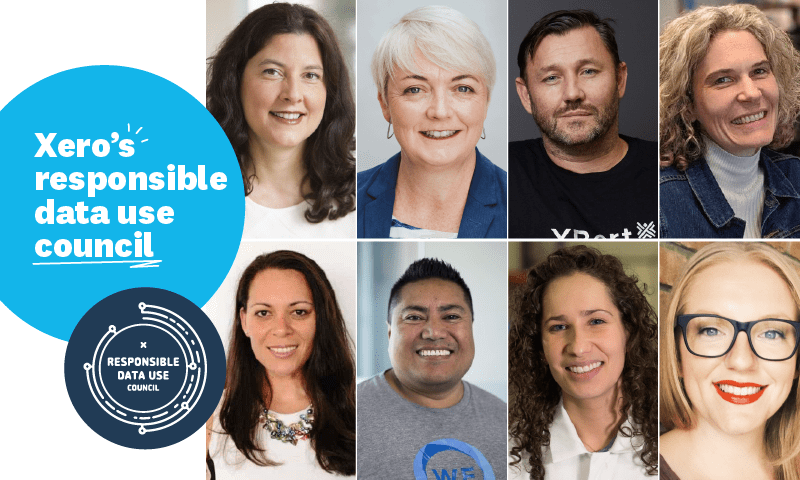
How should small businesses balance artificial intelligence, automation and data privacy?


We recently held our fourth Xero Responsible Data Use Advisory Council meeting via Zoom with seven council members across four time zones to discuss the most important emerging trends around responsible data use for small businesses. How time has flown – we’ve nearly completed our first year of a council.
The council includes myself, Samuel Burmeister of Tall Books (advisor), Laura Jackson of Popcorn Shed (business owner), Maribel Lopez of Lopez Research (analyst), Wyndi and Eli Tagi of WE Accounting (advisors) and Aaron Wittman of XBert (app developer).
We kicked off our time together reviewing the new content we’ve created as a council. Our Data Personality Quiz is up and running, offering a great opportunity for every small business owner to find out where they stand on their journey to data responsibility. Sam joined Maribel on episode 12 of her podcast, Reimagine Hybrid Work. In the episode, the two talked through challenges and opportunities of responsible data use for small businesses. We also recorded a panel discussion with Aaron, Maribel and myself on how small business owners can monetise data ethically and responsibly.
The rise of artificial intelligence (AI) and automation for small businesses
To kick off our first brainstorming session, Maribel guided the group through a discussion on how small businesses can ethically leverage AI. We discussed how many small business owners don’t think AI is relevant for them due to misconceptions around not having enough data, the need for data scientists or the high cost of AI.
Maribel introduced the idea of ‘Big AI’ and ‘Little AI’ to help differentiate between different AI methodologies that can prove to be quite useful for small business owners. While many think they need to have millions of data points and robust infrastructure to get the most out of AI, Maribel noted that there are small, meaningful gains small businesses can make with a data set they already have and the technologies they are already using. She recommended small business owners look first at what’s available from current tech providers and keep up to date on new developments and functions that can be helpful to their business.
However, as Laura Jackson and Aaron Wittman noted, data cleansing for AI apps – the act of managing data sets to add missing information, remove duplication, fix mistakes, and so on – is quite a challenge and can be very hard to maintain. But for many small business owners, the business factors they need to predict (such as how much inventory to order for the holiday shopping season) don’t require sophisticated AI. In many cases, all that’s needed is a relatively simple predictive algorithm that might come built into a software product they already use.
Eli and Sam added that there’s definitely an intimidation factor when it comes to adopting AI for small business owners. Many assume it’s something just from the movies and feel that AI is getting to the point where it can cross that ‘creepy’ line and needs to be kept in check.
The element of trust
Eli then spoke about maintaining the right data privacy mindset when it comes to ecommerce. He noted that while data privacy may not be the first thing small business owners think of, he emphasised the importance of putting into practice a data approach for customers that won’t impact them negatively.
But what can owners do to build trust with their customers? Laura and Wyndi brought to light an issue with terms and conditions, and how most customers don’t completely understand what they’re signing up for when they’re checking the boxes. Laura reiterated the importance of being transparent and clear, but acknowledged that sometimes customers move too quickly and skip reading the terms and conditions to go through and complete their purchase (she dives into this a bit further in an article on the same topic).
Maribel reminded the group that many organisations, including small businesses, create revenue from customer data, so it’s our responsibility as a council to educate small business owners to ask themselves: Is selling someone’s data the right thing to do? Is this really the business you want? To help get started, Maribel recently shared five steps for small business owners to create their own responsible data use policy in this article.
What comes next
It’s been a great first year as a council, discussing and strategising new ways to educate small business owners on how to best harness the power of their data and use it responsibly. We’ve got some exciting things in store for the next few months, a listicle from Laura on cost challenges for small businesses to implement data governance, and a video from Wyndi and Eli on the basics of data-use consent for small business owners. I’m excited to continue our work into Year 2.
Share this article
[addtoany]